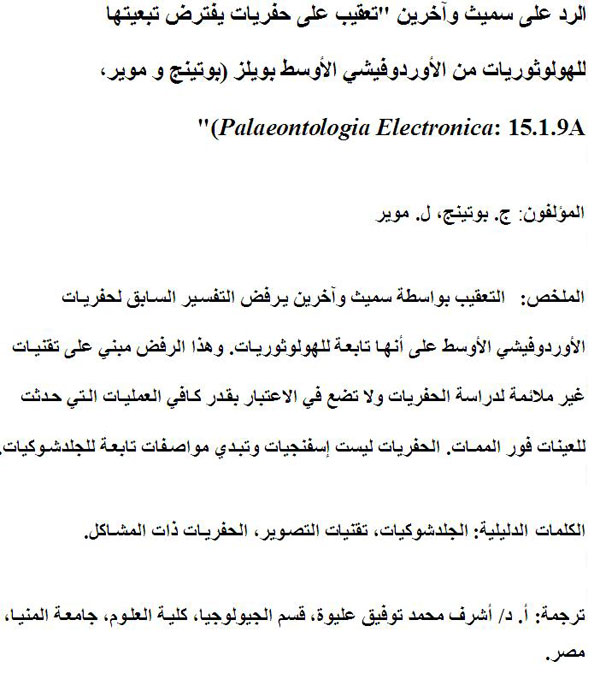Reply to: Smith et al., "Comment on supposed holothurian body fossils from the middle Ordovician of Wales (Botting and Muir, Palaeontologia Electronica: 15.1.9A)"
Plain Language Abstract
The comment by Smith et al. rejects a previous interpretation of Middle Ordovician fossils as holothurians. This rejection is based on the use of inappropriate techniques to study the fossils, and insufficient consideration of their taphonomy. The fossils can be shown not to be sponges (the suggested alternative interpretation), and despite the taphonomic limitations, do show echinoderm characters such as the pentagonal oral ring and ambulacral structures.
Resumen en Español
Respuesta a: Smith et al., "Comentario sobre los supuestos restos fósiles de holoturias del Orodvícico medio de Gales (Botting y Muir, Palaeontologia Electronica: 15.1.9A)"
Smith et al., en su comentario, rechazan nuestra interpretación previa de unos fósiles del Ordovícico medio como holoturoideos. Este rechazo se basa en la utilización de técnicas inapropiadas para el estudio de los fósiles y en una insuficiente consideración de sus aspectos tafonómicos. Se puede demostrar que los fósiles no son esponjas (la interpretación alternativa sugerida por Smith et al.) y que, a pesar de las limitaciones tafonómicas, sí presentan caracteres de equinodermos tales como el anillo oral pentagonal y estructuras ambulacrales.
Palabras clave: Echinodermata; técnicas de tratamiento de imágenes; fósiles problemáticos
Traducción: Miguel Company
Résumé en Français
Réponse à: Smith et al., « Commentaire sur les corps holothuriens fossiles supposés de l'Ordovicien de Wales (Botting et Muir, Palaeontologia Electronica: 15.1.9A) »
Le commentaire par Smith et al. rejette une interprétation précédente des fossiles holothuriens de l'Ordovicien moyen. Ce rejet est fondé sur l'utilisation de techniques d'étude des fossiles inappropriées, et une considération insuffisante de leur taphonomie. Il est possible de démontrer que les fossiles ne sont pas des éponges (l'interprétation alternative suggérée), et malgré les limitations d'ordre taphonomique, ils montrent des caractères d'échinodermes tels que l'anneau oral pentagonal et les structures ambulacraires.
Mots clés: Echinodermata; techniques d'imagerie; fossiles problématiques
Translator: Olivier Maridet
Deutsche Zusammenfassung
Antwort zu: Smith et al., "Comment on supposed holothurian body fossils from the middle Ordovician of Wales (Botting and Muir, Palaeontologia Electronica: 15.1.9A)"
Die Anmerkung von Smith et al. lehnt eine vorangegangene Interpretation von Fossilien aus dem mittleren Ordovicium als Holothuria ab. Diese Ablehnung basiert auf unzutreffenden Methoden bei der Fossiluntersuchung und auf einer unzureichenden Berücksichtigung ihrer Taphonomie. Es kann gezeigt werden, dass die Fossilien keine Schwämme sind (die vorgeschlagene Alternativinterpretation) und dass sie trotz ihrer taphonomischen Begrenzungen Merkmale von Echinodermen wie den pentagonalen Oralring und die Ambulakralstrukturen aufweisen.
SCHLÜSSELWÖRTER: Echinodermata; bildgebende Verfahren; problematische Fossilien
Translators: Eva Gebauer
Arabic

Translator: Ashraf M.T. Elewa

